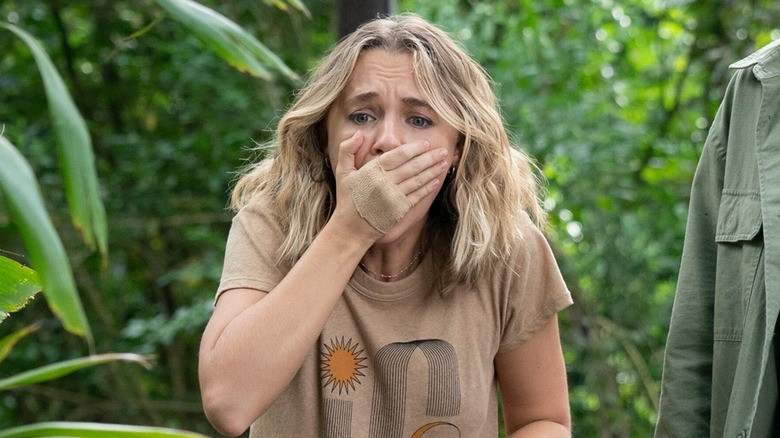The Ending Of I Know What You Did Last Summer Season 1 Explained
Contains spoilers for "I Know What You Did Last Summer"
Like its 1997 big-screen predecessor, Amazon's "I Know What You Did Last Summer" is loosely adapted from Louis Duncan's 1973 YA novel of the same name. The 2021 series involves a group of friends who make a bad choice and suffer dire consequences. The small screen adaptation stays true to Duncan's book in that it leans more into being a suspenseful thriller than a slasher movie, a tonal shift that largely benefits from a little bit more room to breathe over eight episodes.
"I Know What You Did Last Summer," featuring an up-and-coming cast and created by Sara Goodman, sets up the familiar premise in the pilot. Lennon Heck (Madison Iseman) accidentally hits and kills her twin sister Ally with her car. She and her friends cover up the crime, but in a pretty predictable twist, it turns out Ally is the driver and not Lennon. The only people who know the truth are Ally and her father Bruce (Bill Heck), who concoct the story that Ally has run away. Ally assumes her sister's identity, goes off to college, and returns home a year later, just in time for her and her friends to be terrorized by someone who knows the truth.
The murderer is revealed in the Season 1 finale after multiple twists. However, the motives behind the central characters' actions and what the future holds for them are left open to interpretation. We try to make sense of the Season 1 finale of "I Know What You Did Last Summer."
I Know What You Did Last Summer's twisted love story
Margot (Brianne Tju), who figures out the truth about Ally based on selfie angles and hashtags in true Gen-Z fashion, decides to kill anyone she feels hurt Lennon, people Ally cares about, and a few supporting players just to up the gore factor. There's a stand-off between the two girls. Ally maintains that she's Lennon, not that Margot appears to buy it. When the police arrive, Ally lets Dylan (Ezekiel Goodman) take the blame for everything, because protecting Margot means the truth about Lennon remains a secret.
Margot manages to transform into a believable revenge killer, but what's unclear is who she thinks she's in love with. Margot, who chronicles emotional breakdowns on social media, receives the validation she most craves when Ally chooses her over Dylan — a calculated move on Ally's part. If Ally successfully plants a seed of doubt, then Margot gets the object of her obsession. If Margot knows she's Ally, she's got leverage, meaning her last line — "Never leave me, okay?" — can be interpreted as a plea or a warning.
Like Margot's public persona, her relationship with Ally is pure fabrication. Either Ally is a stand-in who gives Margot what Lennon didn't, or Margot deludes herself into believing Lennon is alive. "I don't care what your name is. I have never loved anyone more in my life," Margot says. The true identity doesn't matter, because she doesn't love either girl — just the way they make her feel about herself.
I Know What You Did Last Summer's secrets and lies
Every central character in "I Know What You Did Last Summer" lacks a sense of self. Ally is initially the truest to who she is, but her father persuades her to suppress her personality traits in favor of her sister's. Ally never successfully embodies her sister, a character the series shapes through flashbacks. Lennon's death leaves Ally half of a whole, both condemned by her choice to assume Lennon's identity, and yet free of their dysfunctional relationship because of it.
People turning out to be better or worse than they initially appear is a standard horror trope, with many killers wearing masks to hide their true identities. but "I Know What You Did Last Summer" digs deeper into these characters' double lives. Riley (Ashley Moore), Johnny (Sebastian Amoruso), Dylan, Margot, and Lennon all constantly reinforce how close they are, yet they're blindsided by revelations that contradict the consensus reality they've all assumed. Whether the audience will be satisfied with the explanations offered as everyone's ulterior motive is a very open question. Ally's opening voiceover introduces the series' exploration of isolation, secrecy, retribution, and people's boundless ability to compartmentalize, hiding their darkest thoughts and actions — even from themselves.
I Know What You Did Last Summer's mysterious cult and Riley's return
The lingering influence of the mysterious cult is evident in the finale, although all of its members and their beliefs remain shrouded. The cult's main purpose in Season 1 is to provide a pool of possible suspects, including Clara (Brooke Bloom), Bruce, Dylan, and the twins' mother. Dylan's involvement with the group makes it easier to for him to be the fall guy, since he's spewing emo nuggets about how there's no redemption in this life. He's not a murderer, but he is complacent and pretty shady, so when Margot, Ally, and Bruce set him up, viewers aren't likely to have much sympathy for his plight.
Answers about the brain-eating spiders, honey, and bizarre cave rituals remain unanswered, which would point to the cult factoring heavily into a potential second season. The series infuses the group with supernatural powers, evidenced by Riley's apparent return from the dead in the finale's last moments. Season 2 could build on her return and offer a more fleshed-out backstory for the cult, while also providing insight into how they recruited Bruce and Dylan. Riley's return seems significant, but only another season can explain why — unless her reincarnation is just a toned-down jump scare meant to generate water-cooler debate.
Ally's darkest secret is exposed
Episode 8 of "I Know What You Did Last Summer" drops the bombshell that Ally may have wanted her sister dead all along. The opening scene appears to be a flashback to that night of the accident, only this time it doesn't seem like much of an accident. When Ally sees Lennon running toward the car, she actually steps on the gas. It turns out to be a dream, but coupled with the revelation that Allison told her sister on the night of her graduation party that she wanted Lennon to die, it does raise serious questions about whether Allison actually regrets her role in Lennon's death or just feels guilty that she's relieved her twin is gone.
Either way, Allison's guilt reaches its zenith in the finale. Does Allison's subconscious belie her grief? Is there a part of her that wishes her role in Lennon's death was intentional? Or does she fail to see the distinction between an accident and cold-blooded murder, because she vocalized her darkest innermost desire only to see it come to fruition?
Death fails to sever the twins' connection in the end. Ironically, Ally finds herself even more inextricably bound to Lennon due to the events of that fateful night.




